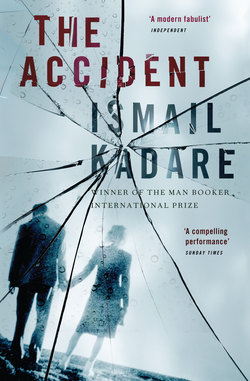Читать книгу The Accident - Ismail Kadare - Страница 11
На сайте Литреса книга снята с продажи.
Оглавление7
It was hard to tell which results of the inquiry the secret services had found useful in building up their portrait of Besfort Y. Sometimes it may have been the names of the hotels, especially when these hotels, or the cities where they were located, were also mentioned in the files on “Albanian terrorists”, as the Yugoslavs called the insurgent leaders when they travelled to these places. However, they had also probably relied on the more ingenious interpretations of Besfort’s behaviour as “psychotic”, based mainly on the evidence of Rovena St.’s conversations with her friends. To one friend, Rovena had recounted Besfort’s dreams of a summons to The Hague. Then there were Shpresa’s parting words on the phone: “look after yourself! I have an uncanny feeling …”
Meanwhile, Besfort Y.’s final message, now known as the “cynical note”, was translated into most of the working languages of the Council of Europe, sometimes with cautious annotations: “Is this translation accurate? Do the words ‘conditions’ and ‘OK’ have the same connotations in the Albanian original?” These were quoted alongside the Serbian commentaries which were eager to show that the analyst Besfort Y. was a dangerous schizophrenic, or worse.
On the list of twenty-nine personalities whose comments and reporting, according to the Serbian intelligence services, had succeeded in bamboozling the governments of the West, Besfort Y. was a lesser light when set against stars of the first magnitude such as Bill Clinton, Wesley Clark, Madeleine Albright and the rest. However, when it came to obscure impulses, often of a personal origin, which had turned these leading figures against poor Yugoslavia, then Besfort Y. was the only one whose commitment could be compared to that of the American president. The latter’s affair with Monica Lewinsky was like a harmless idyll when set against the poisonous fury of this Albanian analyst, to whom destroying a state seemed to offer the same satisfaction as possessing, or rather subjugating, a woman. The reported phrase “after Serbia was defeated, you turned on me again” left no doubt that this analyst’s political passions had affected his love life.
The unidentified researcher explained more lucidly than any of his predecessors why the secret services became even more keen after the drama was over. It was true that the curtain had fallen and the Hague Tribunal now had the former Serbian leader on trial, but there was no stemming the flood of Europe’s remorse. The entire conflict was being reassessed, and shouts of “Send them to The Hague!” grew ever more strident, and this time not for the vanquished, but for the victors. As one historian wrote, Serbia hoped to recover her lost Kosovo not by force of arms but with the help of pathos and pity for her ruin.
As if compensating for the obscure and enigmatic parts, this section of the inquiry was of exemplary clarity, with endless names, dates, newspaper headlines, quotations from the news, statements and rebuttals. Personalities with totally contrary opinions jostled together. Alain Ducelier, William Walker, Tony Blair, Günter Grass, Noam Chomsky, André Glucksmann, Harold Pinter, Bernard-Henri Lévy, Paul Garde, Peter Handke, Pascal Bruckner, Mother Teresa, Ibrahim Dominik Rugova, Seamus Heaney, Pope John Paul II, Patrick Besson, Gabriel Keller, Ismail Kadare, Claude Durand, Bernard Kouchner, Régis Debray, Jacques Chirac Pontifex (defender of the bridges of Belgrade), Bogdan Bogdanovi´c Ponticrash (architect and ideologist of the destruction of these same bridges), the Dalai Lama, Cardinal Ratzinger, and so on.
According to the unnamed researcher, both the Serbs’ gratitude to their defenders and their hatred for their destroyers, which Balkan custom suggested would persist for centuries, had unexpectedly begun to fade. The new geopolitics of the peninsula, the Stability Pact for South Eastern Europe and the queue at the gates of Europe as these stubborn states, whether allies or enemies yesterday, waited together to join the family of their dreams, had achieved the impossible. Their vows of revenge, their rage and whining of the past were now recalled with more curiosity than pain.
Certain rumours at the time were slower to fade, such as the persistent claim that Mother Teresa had been the moving spirit behind the bombing of Yugoslavia, with her midnight phone call to the American president, “My son, do something for my Albanians, punish Serbia,” while a song about the punitive president went round the bars:
Take Monica away
And the Serbs will pay.
If you miss getting laid
Give it to Belgrade …
Now the researcher himself, always detached and impartial, suddenly seemed to be in a hurry to set aside this epic conclusion of events, and to follow an entirely different track.
